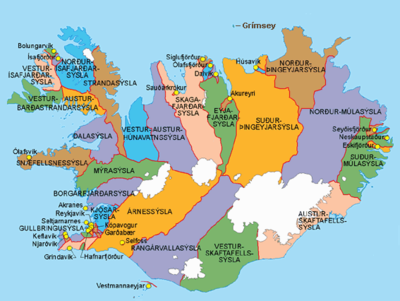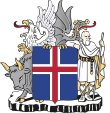Counties of Iceland
You can helpexpand this article with text translated fromthe corresponding articlein Icelandic.(January 2022)Click [show] for important translation instructions.
|

 |
|---|
|
|
Icelandwas historically divided into 23countiesknown assýslur(Icelandic pronunciation:[ˈsistlʏr̥]), and 23 independent towns known askaupstaðir([ˈkʰœypˌstaːðɪr̥]). Iceland is now split up between 24sýslumenn(magistrates) that are the highest authority over the localpolice(except inReykjavíkwhere there is a special office of police commissioner) and carry out administrative functions such as declaringbankruptcyandmarryingpeople outside of the church. The jurisdictions of these magistrates often follow the lines of the historical counties, but not always. When speaking of these new "administrative" counties, the custom is to associate them with the county seats rather than using the names of the traditional counties, even when they cover the same area.
Composition[edit]
Independent towns (kaupstaðir) were first created in the 18th century as urbanisation began in Iceland; this practice continued into the 1980s. The last town that was declared an independent town wasÓlafsvíkin 1983. Since then, the laws regardingmunicipalitieshave been changed in such a way that there is no longer any distinction made between urban or rural municipalities.
Historical counties[edit]
The historical counties were:
- Árnessýsla[ˈaurˌnɛsˌsistla]
- Austur-Barðastrandarsýsla[ˈœystʏr-ˈparðaˌstrantarˌsistla]
- Austur-Húnavatnssýsla[ˈœystʏr-ˈhuːnaˌvasːˌsistla]
- Austur-Skaftafellssýsla[ˈœystʏr-ˈskaftaˌfɛlsˌsistla]
- Borgarfjarðarsýsla[ˈpɔrkarˌfjarðarˌsistla]
- Dalasýsla[ˈtaːlaˌsistla]
- Eyjafjarðarsýsla[ˈeiːjaˌfjarðarˌsistla]
- Gullbringusýsla[ˈkʏtl̥ˌpriŋkʏˌsistla]
- Kjósarsýsla[ˈcʰouːsarˌsistla]
- Mýrasýsla[ˈmiːraˌsistla]
- Norður-Ísafjarðarsýsla[ˈnɔrðʏr-ˈiːsaˌfjarðarˌsistla]
- Norður-Múlasýsla[ˈnɔrðʏr-ˈmuːlaˌsistla]
- Norður-Þingeyjarsýsla[ˈnɔrðʏr-ˈθiŋkˌeiːjarˌsistla]
- Rangárvallasýsla[ˈrauŋkˌaurˌvatlaˌsistla]
- Skagafjarðarsýsla[ˈskaːɣaˌfjarðarˌsistla]
- Snæfellsnes- og Hnappadalssýsla[ˈstnaiːˌfɛlsˌnɛːs-ɔɣˈn̥ahpaˌtalsˌsistla]
- Strandasýsla[ˈstrantaˌsistla]
- Suður-Múlasýsla[ˈsʏːðʏr-ˈmuːlaˌsistla]
- Suður-Þingeyjarsýsla[ˈsʏːðʏr-ˈθiŋkˌeiːjarˌsistla]
- Vestur-Barðastrandarsýsla[ˈvɛstʏr-ˈparðaˌstrantarˌsistla]
- Vestur-Húnavatnssýsla[ˈvɛstʏr-ˈhuːnaˌvasːˌsistla]
- Vestur-Ísafjarðarsýsla[ˈvɛstʏr-ˈiːsaˌfjarðarˌsistla]
- Vestur-Skaftafellssýsla[ˈvɛstʏr-ˈskaftaˌfɛlsˌsistla]
Independent towns[edit]
The 23 independent towns were:
- Akranes
- Akureyri(withGrímsey)
- Bolungarvík
- Dalvík
- Eskifjörður
- Garðabær
- Grindavík
- Grundarfjörður(in the past)
- Hafnarfjörður
- Húsavík
- Ísafjörður
- Keflavík
- Kópavogur
- Neskaupstaður
- Njarðvík
- Ólafsfjörður
- Ólafsvík
- Reykjavík
- Sauðárkrókur
- Selfoss
- Seltjarnarnes
- Seyðisfjörður
- Siglufjörður
- Vestmannaeyjar

